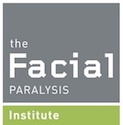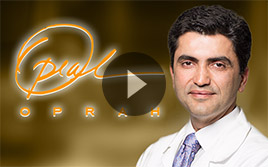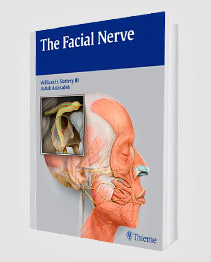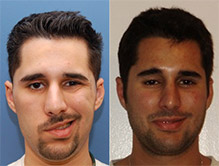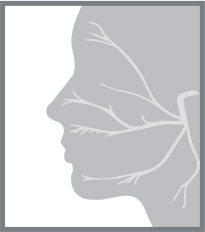What to Do If You Have Facial Nerve Damage After Acoustic Neuroma Surgery
Acoustic neuroma surgery sometimes requires the removal or manipulation of a section of the facial nerve. Due to the delicate nature of the facial nerve, residual swelling and damage may cause temporary or permanent facial paralysis and synkinesis. Patients generally require at least a year for recovery after an acoustic neuroma procedure. If the facial nerve is damaged during acoustic neuroma removal, facial reanimation surgery may be required to address the issue.
Dr. Babak Azizzadeh of The Facial Paralysis Institute is a globally recognized facial plastic and reconstructive surgeon who understands all aspects of acoustic neuroma surgery. He does everything possible to help an acoustic neuroma patient maintain the integrity of the facial nerve. If facial reanimation surgery is required following an acoustic neuroma procedure, Dr. Azizzadeh takes the necessary steps to ensure a patient can achieve the best-possible outcome.
Acoustic Neuroma Treatment Options
Facial reanimation surgery helps acoustic neuroma patients improve symmetry of the face, eyes and eyebrows, reduce facial tension and tightness and enhance natural facial movement during communication. If a patient does not regain facial movement and/or suffers from severe synkinesis after acoustic neuroma surgery, he or she may benefit from facial reanimation surgery. Depending on the acoustic neuroma patient, Dr. Azizzadeh may recommend one of the following facial reanimation procedures:
• Hypoglossal-Facial Nerve Transfer: Uses the hypoglossal nerve (nerve that controls tongue movement) to provide nerve input into a non-functioning facial nerve and facial muscles. A hypoglossal-facial nerve transfer “moves” the face with tongue thrusting, and it enables Dr. Azizzadeh to create resting muscle tone.
• Masseter-Facial Nerve Transfer: Utilizes the masseteric nerve (trigeminal nerve) to give nerve input into the facial nerve. Dr. Azizzadeh uses a masster-facial nerve transfer to create resting facial tone, reduce synkinesis and enhance the smile mechanism.
• Gracilis Muscle Transplant: Improves smiling and speech during everyday communication. A gracilis muscle transplant involves the transfer of the normal facial nerve on the opposite side of the facial paralysis as the nerve source. During a gracilis muscle transplant, Dr. Azizzadeh transfers a new facial muscle to substitute for and/or complement a patient’s existing smile movement.
• Temporalis Tendon Transfer: Offers a static procedure that promotes dynamic facial muscle movement. Dr. Azizzadeh uses a temporalis tendon transfer to secure a muscle or muscle tendon to a corner of a patient’s mouth. As a result, a temporalis tendon transfer lifts the mouth and improves the smile.
• Surgery for Synkinesis: May consist of selective neurolysis, which involves mapping out the facial nerves with intraoperative electromyography (EMG) and selectively decreasing the activity of facial nerves that make it tough for a patient to smile. Or, Dr. Azizzadeh may use static suspension of the corners of the mouth, blepharoplasty (eyelid surgery) or an asymmetric facelift treatment to address synkinesis symptoms.
Dr. Azizzadeh takes a multidisciplinary approach to determine the best facial reanimation surgery for an acoustic neuroma patient. He performs an extensive patient evaluation to understand a patient’s symptoms and requests a series to tests as part of his analysis. Then, Dr. Azizzadeh provides a personalized facial reanimation surgery recommendation to a patient and responds to this individual’s treatment concerns and questions. He also helps a patient establish realistic expectations for a facial reanimation procedure, and by doing so, allows him or her to accomplish the optimal results.
If an acoustic neuroma surgery patient experiences facial paralysis after treatment, it is important to consult with a facial plastic and reconstructive surgeon. That way, a patient can review his or her facial reanimation surgery options and correct any facial nerve damage before it escalates.
Dr. Azizzadeh is happy to meet with patients who experience facial paralysis following acoustic neuroma surgery and provide them with facial reanimation treatment recommendations. To set up a consultation with Dr. Azizzadeh, please contact us today at (310) 657-2203.
Request your consultation with Dr. Azizzadeh today
Call us at (310) 657-2203 to schedule an appointment.
Schedule a Consultation